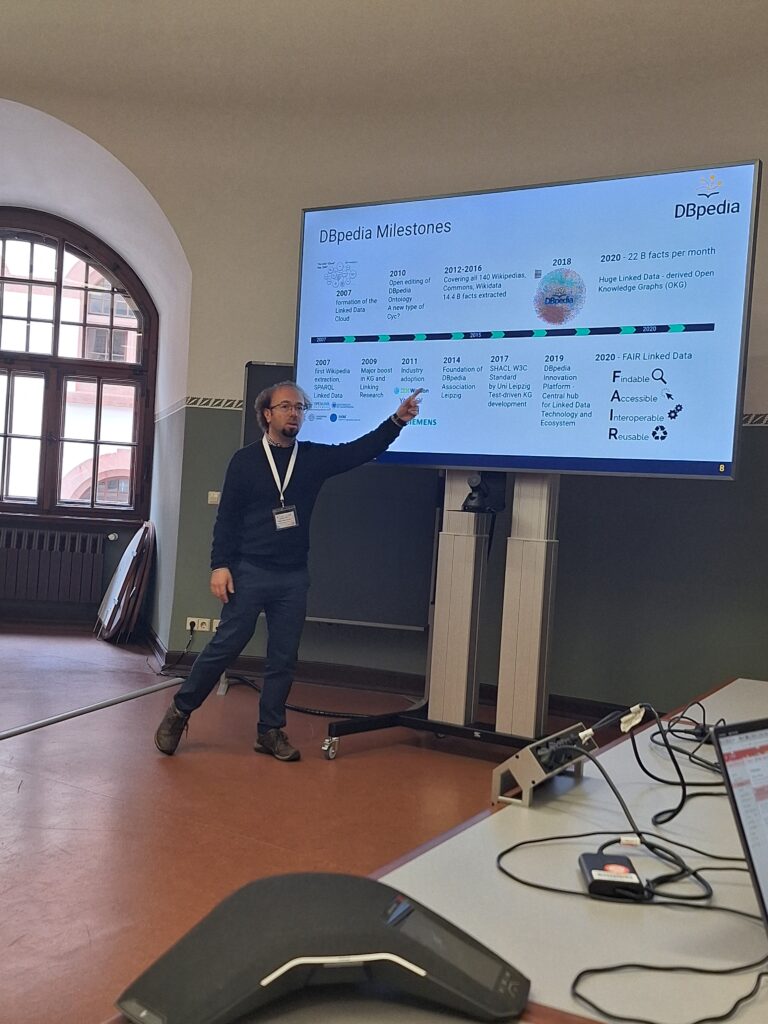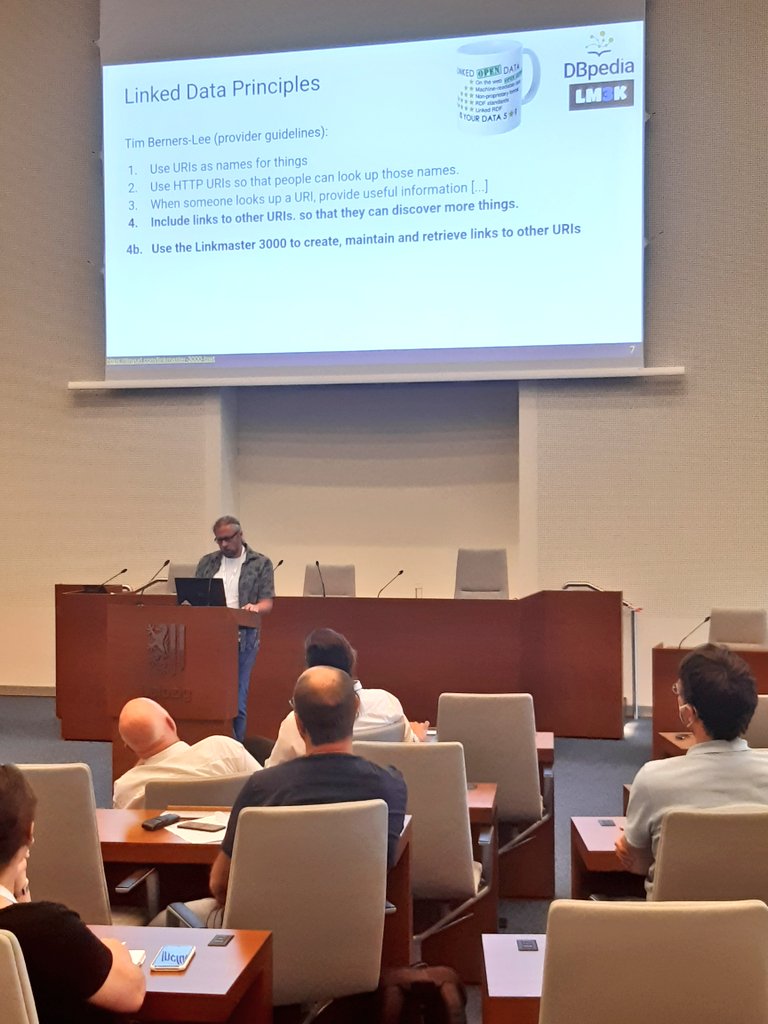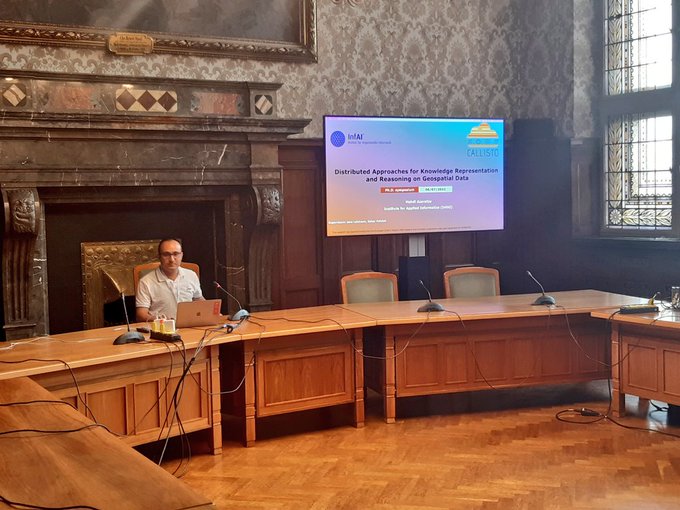The post Recap: DBpedia Training @ Data Week Leipzig appeared first on DBpedia Association.
]]>
On 16 April, as part of Data Week Leipzig, the DBpedia training on the topic of “Harnessing the Power of DBpedia: Transforming Data into Knowledge” took place with three sessions and different presentations in each. This workshop was designed to introduce you to the vast capabilities of DBpedia and its suite of technologies that are reshaping the way we interact with the world’s knowledge. This tutorial gave all participants an insight into the comprehensive DBpedia technology ecosystem. It was also an opportunity to learn how to integrate and leverage these components to create innovative solutions.
Opening of the DBpedia Training
Milan Dojchinovski (InfAI, DBpedia Association, CTU Prague) and Sebastian Hellmann (InfAI, DBpedia Association) started the opening of the DBpedia Training with general information on the tutorial. Topics of this training were DBpedia in the nutshell, the DBpedia Databus, Databus Use Cases and Deploying your own DBpedia. We also presented four showcases: Semantic Indexing and Search using DBpedia tech, CI and Databus publishing using Jenkins, Databus Metadata Overlay Search System and Terminology Server using Databus, Lookup and Archivo.
Session 1: DBpedia Tech Overview and DBpedia Databus
In the first session, Milan Dojchinovski gave an overview of DBpedia and Sebastian Hellmann gave an introduction to Databus Use Cases, followed by the presentations on “Databus and Collections” and “Making your own DBpedia KG” by Jan Forberg.
Session 2: DBpedia and Databus Showcases: Semantic Indexing and CI
The second session started with “Semantic Indexing and Search using DBpedia Spotlight and Databus” by Jan Forberg which was followed by Kirill Yankov with “CI and Databus publishing using Jenkins”.
Session 3: DBpedia and Databus Showcases (cont.): Metadata Overlay Search and Terminology Server
In the last session, Jan Forberg and Jonathan Justavino Lüderitz talked about “Databus Metadata Overlay Search System (MOSS)”. The final presentation was given by Johannes Frey on “Terminology Server using Databus, Lookup and Archivo”.
Closing Session
Finally, in the closing session, chaired by Milan Dojchinovski (InfAI, DBpedia Association, CTU Prague) there was time for a little wrap-up, questions and feedback on the DBpedia Training.
The slides from the DBpedia Training are available here.
We are looking forward to more DBpedia events in the next months. Stay safe and check Twitter or LinkedIn. Furthermore, you can subscribe to our Newsletter for the latest news and information around DBpedia.
Maria & Julia
on behalf of the DBpedia Association
The post Recap: DBpedia Training @ Data Week Leipzig appeared first on DBpedia Association.
]]>The post Wrap up Data Week Leipzig 2022 appeared first on DBpedia Association.
]]>Following, we will give you a brief retrospective about DBpedia @ the LSWT 2022 as well as the first DBpedia Knowledge Engineering PhD Symposium.
DBpedia @ the LSWT 2022

On Tuesday, 5th July, the Leipzig Semantic Web Day (LSWT) took place as part of the Data Week Leipzig. It was an opportunity for scientists, enterprises, and organizations to discuss topics in the field of Semantic Technology. These emphases are demonstrated in presentations by experts from industry and science.
As a part of the LSWT and the session “Data Acquisition and Data Sovereignty“ Sebastian Hellmann (AKSW, InfAI/DBpedia) presented „Linkmaster 3000. If it’s not linked, does it even exist?“.
Later that day, Denis Streitmatter (AKSW, InfAI/DBpedia) gave his talk „Why we need Archivo“ as part of the session “Collaboration and Ontologies”.
1st DBpedia PhD Symposium
Wednesday, July 6th, was all about scientific exchange where junior and senior researchers establish relations and collaborations and exchange ideas. The goal of the event manifests a scientific community as a driver for DBpedia and Linked Data and expects synergies effects that will greatly improve scientific output by the involved community members.
To start the day, Sören Auer (TIB) opened the first PhD Symposium with words of welcome and by giving insights into his experience on “what makes a good PhD”.
The first session started with presentations by Aleksandr Perevalov on “Multilingual Accessibility of Knowledge Graph Question Answering Systems” and Johannes Frey on “Towards FAIR Linked Data Integration”.
After a short coffee break, session 2 started with Marvin Hofer speaking about “Multilingual Accessibility of Knowledge Graph Question Answering Systems”. This was followed by the contribution of Fidan Limani “Bringing Research Artifacts (as closer) Together: Knowledge Graphs for Libraries”.
Afternoon Session
The last Session of the day was started by Gollam Rabby and his topic “Machine Learning on Semantic Scientific Knowledge” followed by Mehdi Azarafza and his presentation about “Distributed Approaches for Knowledge Representation and Reasoning on Geospatial Data”. Afterwards Mirza Mohtashim Alam was speaking about “Representation and Reinforcement Learning on Knowledge Graphs” and Paulo Ricardo Viviurka do Carmo closed the last session with his presentation on “Unsupervised Information Extraction from Academic Data Sources to Knowledge Graphs”.

While the students held their presentations, they received feedback and on the other hand, the symposium participants gained insight 1) on how they structure and define their PhDs, 2) on what the current trends are and 3) on potential connecting a dedicated poster session where all PhD participants could bring their poster and discussed with the audience during the coffee breaks.
Closing
As the first DBpedia PhD Symposium came to an end, Sebastian Hellmann (AKSW, InfAI/DBpedia) and Milan Dojchinovski (DBpedia & CTU Prague) closed the meeting. Afterwards all participants were gathered for a city walking tour followed by the Living Lab Tour.
In case you missed the event, our presentations are available on the DBpeda event page. Further insights, feedback and photos about the event are available on Twitter (#DBpediaPhDSymposium hashtag).
Stay safe and check Twitter or LinkedIn. Furthermore, you can subscribe to our Newsletter for the latest news and information around DBpedia.
Julia & Emma
on behalf of the DBpedia Association
The post Wrap up Data Week Leipzig 2022 appeared first on DBpedia Association.
]]>